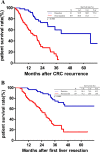Prognostic significance of the number of tumors and aggressive surgical approach in colorectal cancer hepatic metastasis
- PMID: 24885967
- PMCID: PMC4032633
- DOI: 10.1186/1477-7819-12-155
Prognostic significance of the number of tumors and aggressive surgical approach in colorectal cancer hepatic metastasis
Abstract
Background: Although liver resection (LR) for colorectal cancer (CRC) hepatic metastasis is the best strategy to improve patient outcomes, there are considerable concerns regarding the recurrence of CRC after LR. In this study, we investigated the prognostic indicators associated with CRC recurrence after LR for hepatic metastasis.
Methods: This is a retrospective review of patients who underwent curative LR for CRC hepatic metastasis between January 2008 and December 2012. The clinicopathological features and outcome parameters affecting prognosis were analyzed.
Results: A total of 332 LRs with curative intent were performed in 278 patients, of whom 168 (60.4%) experienced CRC recurrence after the first LR, and 206 of the 332 LRs (62.0%) developed CRC recurrence. A preoperative serum carcinoembryonic antigen level greater than 100 ng/mL and four or more metastatic tumor nodules were independent prognostic factors for CRC recurrence after LR. The disease-free survival rate after LR was significantly associated with the number of metastatic nodules. The patients who underwent surgical resection for recurrent CRC had favorable outcomes, with a five-year overall survival rate of 65.2%.
Conclusion: The number of metastatic tumors significantly affects the outcomes of patients who undergo LR for CRC hepatic metastasis, indicating that a novel therapeutic strategy for patients at high risk may be required. However, favorable long-term outcomes are achievable through aggressive treatment with surgical resection of the recurrent CRC.
Figures




References
-
- Nordlinger B, Van Cutsem E, Gruenberger T, Glimelius B, Poston G, Rougier P, Sobrero A, Ychou M. European Colorectal Metastases Treatment Group; Sixth International Colorectal Liver Metastases Workshop. Combination of surgery and chemotherapy and the role of targeted agents in the treatment of patients with colorectal liver metastases: recommendations from an expert panel. Ann Oncol. 2009;20:985–992. doi: 10.1093/annonc/mdn735. - DOI - PubMed
-
- Manfredi S, Lepage C, Hatem C, Coatmeur O, Faivre J, Bouvier AM. Epidemiology and management of liver metastases from colorectal cancer. Ann Surg. 2006;244:254–259. doi: 10.1097/01.sla.0000217629.94941.cf. - DOI - PMC - PubMed
Publication types
MeSH terms
LinkOut - more resources
Full Text Sources
Other Literature Sources
Medical

